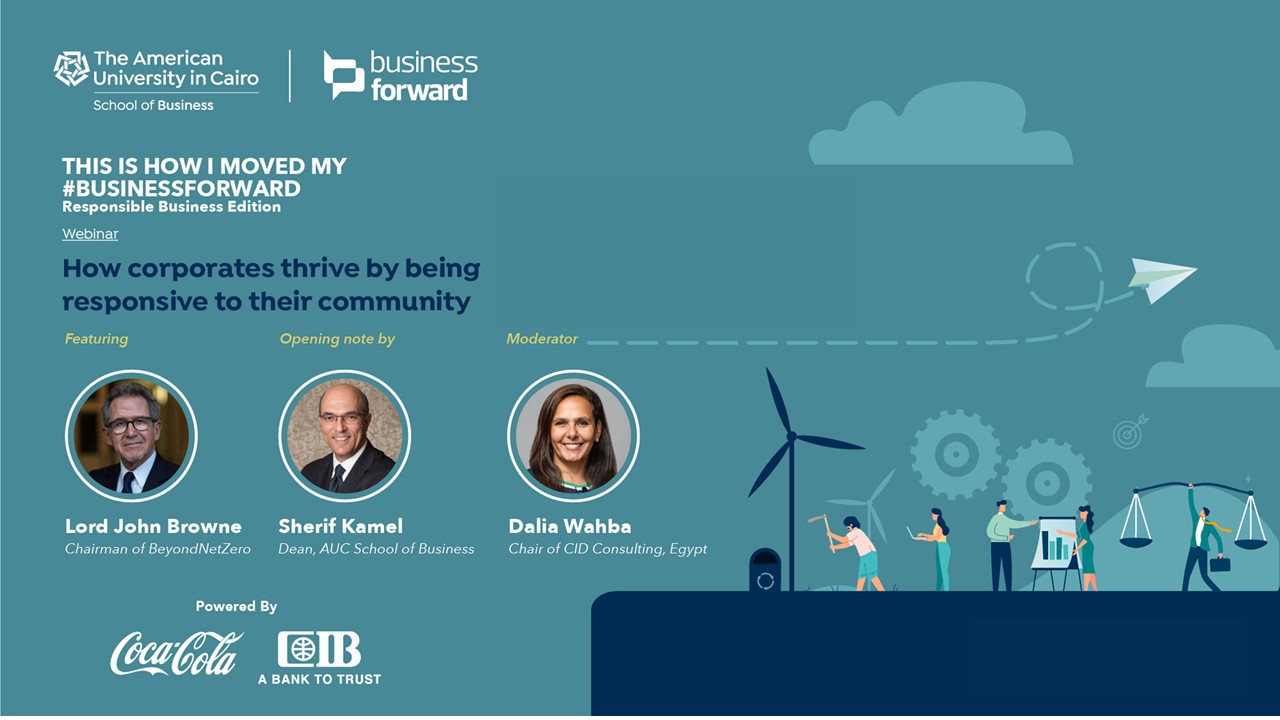Saving the environment, building back better, corporate social responsibility, are all examples of buzzwords that have been circling in the business society the world over for the past couple of years, but they have thus far fallen short in creating the kind of sustainable business development that considers business growth as well as environmental protection.
In a recent webinar hosted by Business Forward, Lord John Browne, Chairman of BeyondNetZero and previous chief executive of British Petroleum, joined in with an informed opinion on what corporates should be doing in the changing business environment of today, to ensure connecting with their communities and contributing positively to saving the planet. The webinar, moderated by Dalia Wahba, CEO of CID Consulting, and inaugurated by Sherif Kamel, dean of the AUC School of Business, is part of our campaign on responsible business, ‘This is How I Moved My Business Forward’, aiming to spotlight stories of Egyptian businesses who managed to make through the past two years while building a more sustainable and inclusive business model.
“The objective of the campaign is to support a positive narrative about corporate responsibility; highlighting successful examples that show that responsible business principles can be embedded in both the strategic vision, objectives and the operations of any corporation. Responsible business is not just a PR tool, but something that brings value and that can benefit local companies regardless of their size,” explained Dean Kamel in his opening remarks, before he gave way to the insights brought forth by Lord Browne.
Straight off the bat, Lord Browne made an unconventional link between the challenges facing the corporate world today in terms of the push for more sustainability and the challenges that once faced, and led to the demise of, the world trade order under the colonial framework of the British Empire two centuries ago.
“At its heyday in the 18th century, the world’s first multinational, the East India Company, accounted for more than half the world’s trade; it deployed a private army to rule over its subjects who numbered over one-fifth of the world’s population. Successive generations of British men used the company to loot India and its riches to fund lavish lifestyles,” explained Lord Browne.
“This business model of exploitation worked well for over 250 years, but in the end, its irresponsible behavior was the cause of its own downfall,” asserted Lord Browne. “Legacy of that period and the ill-will it created still shape geopolitical and societal relationships today. Trust between business and society matters for a number of reasons.”
Lord Browne argued that corporates of today ought to pay attention to the kind of relationship they have with their societies. Falling into the same trap of the East India Company of not paying attention to the harmful impact of business operations on societies will eventually lead to the demise of the corporates that fail to do so – back then the reason was the exploitation of resources, now it’s the exploitation of the environment.
“Business is the engine of human progress, but that engine doesn’t always run smoothly,” said Browne. “Societies have always had a difficult relationship with businesses, leading to cycles of suspicion and mistrust. Some business leaders are content to let these cycles play out, believing that trust always returns, but the evidence shows that the failure to change this pattern is hugely damaging, for them and for wider society.”
And while back in the time, holding corporates accountable for their irresponsible behavior was a lengthy process, the times have turned.
“Today’s technology and global communication [mean] that when trust breaks down, reputation can be destroyed on a global scale,” said Lord Browne.
“People now have the tools to hold companies to account in real-time. Transparency and accountability are no longer optional. Gaining society’s trust must be an outcome of a company’s fundamental business strategy. It is not something that can be confected or managed.”

Browne went on to further assert that business leaders have to prioritize and integrate the concerns of society into the decisions they make.
But with climate change being an existential survival threat for all humanity, should we blindly trust corporates to do what’s necessary, or do governments and financial institutions also have a crucial role?
“I think there needs to be some effective regulatory push to require people to set targets and hit them on a very short-term basis, year-by-year as opposed to in thirty years,” said Lord Browne. “What governments should do is set frameworks like incentives in the form of price or taxes, and also we need to make sure that when deadlines are set that they’re actually practical, there’s nothing good about setting deadlines that can’t be achieved.”









